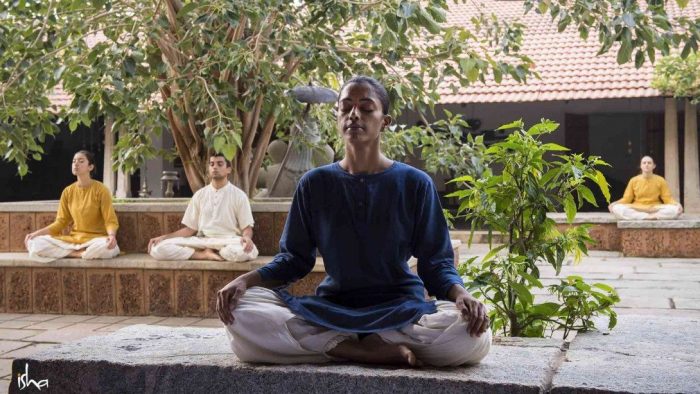In most parts of the world, the concept of work-life balance does not seem to exist. Work takes over life and ultimately gives rise to stress. It is thought that stress is directly proportional to hard work and success. But it is forgotten that stress is also directly proportional to health disorders - both physical and mental.
The mind has multiple thoughts running haywire every minute and is never idle. These multiple thoughts are triggers to constant physical actions. Constant physical action takes a toll on mental health. The success one achieves at work is short lived and the stress originates again to achieve the next thing. At a time like this, many are grappling with anxiety and depression. The fear of the virus, the fear of losing one who is a victim of the virus, the fear of unemployment, the fear of social isolation and many more fears that this pandemic is causing in people is on a high. Fear, stress are assumed to become a part of life, which in fact occurs when one does not know to take care of the mind.
When you talk of the mind, it is important to talk of the Self too. The mind is completely activated only when it integrates with the Self or in other words, the soul. This awareness of the Self enables one to mould their thoughts in a more amicable way- and one is able to think better and perform better. Consider a pool of muddy water- as long as it is disturbed, there is no clarity in the water. Allow it to stand still, the mud settles down and one can see the water clearly. This is what Self-awareness can do to one's muddled thoughts. One’s actions will not be impulsive and will be well thought out. There is no room for irrational behaviour. As one is in control of our own thoughts and emotions, it gives them emotional resilience.
Having the control of your own life is like a smooth running machine- no oil leaks, no strange noises- the productivity is at a high which elevates confidence and ultimately leading to elevated happiness Yoga and meditation help to balance the two aspects of the mind and soul creating harmony inside. Inner engineering uses the ancient practises of Yoga and creates a positive state of mind. In other words, it is a distilled essence of Yoga and meditation. The brain is a software that can be programmed. When one programmes the inside, their thoughts and attitudes are shaped that can be presented to the outside world.
Isha foundation in collaboration with scientists from Harvard published two papers that show the benefits of Inner Engineering (IE) on physical, emotional and mental health. The IE program consists of guided meditations, discourses on the nature of the mind and practical wisdom to take care of life’s curve-balls. It also includes the Shambhavi Mahamudra Kriya that diverts all the energies to one direction and does not let it dissipate from the sensory outputs.
The first study was conducted on 60 employees from an US-based Fortune-500 where the impact of IE on (i) their well-being which includes the following factors: energy, joy, mindfulness, a sense of wholeness within oneself, and connection with colleagues, and (ii) positive organisational behaviour which included meaningful work, psychological capital, and work engagement. The program was conducted for 40 days with a survey before and after the program on the following attributes: (i) Psychological capital, (ii) Self-Efficacy, (iii) Hope, (iv) Optimism, (v) Work engagement, (vi) connection with work, (vii) Dedication, (viii) Vigour, (ix) Mindfulness, (x) Inclusiveness, (xi) Joy, and (xii) Vitality.
The study showed an increase of 13% in psychological capital, 19% increase in Self-efficacy and Joy. The employees also stated that they experienced better growth in their work and with it came a sense of pride and accomplishment.
The second study was conducted to observe the impact of IE on professional efficiency and burnout caused due to chronic workplace stress. The study was conducted at S2Tech, an IT services company. The study was conducted in two phases among two groups wherein the participants were advised to follow IE online programs as well as to read a book or journal of their own choice. At the end of the study, although the burnout levels showed no difference from before and after the study, the perceived stress score showed a 50% decrease.
Among those who had participated in the IE program were allowed to take part in the Bhava Spandana Program- a 4-day advanced yoga and meditation retreat. The study conducted a survey before and after to assess the anxiety, depression, focus, well-being, and happiness through validated psychological scales. Blood samples were collected before and after the study to measure the concentrations of the biomarkers anandamide, 2-arachidonoylglycerol (2-AG), 1-arachidonoylglycerol (1-AG), docosahexaenoyl ethanolamide (DEA), oleoylethanolamide (OLA), and BDNF. (Anandamide is derived from the Sanskrit word ‘Anand’ meaning happiness). These are the Endocannabinoids (eCBs) that indicate increased happiness and reduced anxiety or depression.
The study showed elevated levels of eCBs. They also observed that this impact lasted an entire month. Further studies are to be conducted to understand the role of eCB in mediating the positive responses of meditation and the impact of meditation on anandamide inhibitor FAAH. They also want to investigate the sustained benefits of meditation that lasts upto a month.
REFERENCES:
Inner Engineering Online Intervention for a Fortune 500 Company- Isha Foundation and Rutgers University
Inner Engineering Online Intervention for S2Tech- Isha Foundation and Harvard Medical School
Senthilkumar Sadhasivam et al., Inner Engineering Practices and Advanced 4-day Isha Yoga Retreat Are Associated with Cannabimimetic Effects with Increased Endocannabinoids and Short-Term and Sustained Improvement in Mental Health: A Prospective Observational Study of Meditators, Hindawi Evidence-Based Complementary and Alternative Medicine Volume 2020
Mental Health an Emerging Crisis of COVID Pandemic- Katherine Kam




